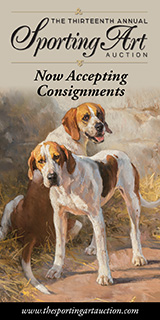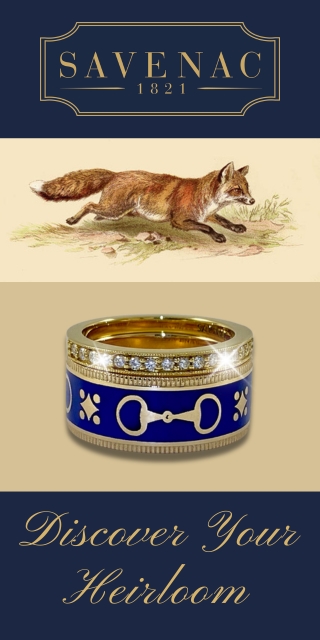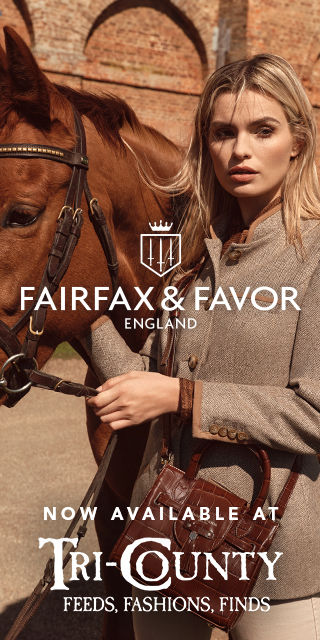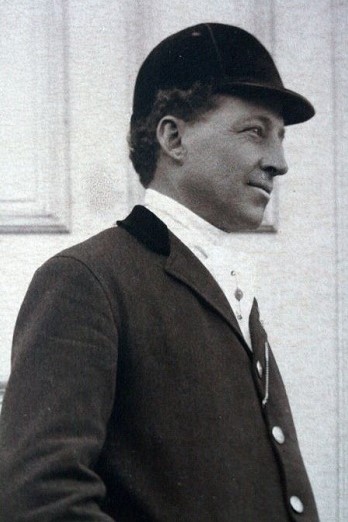 Harry Worcester Smith in hunting attire, circa 1910, from the Harry Worcester Smith Archive (MC0041), National Sporting Library & MuseumThis week’s Bonus article, free to all (no subscription necessary), is an excerpt from Chapter 10 of “The Great Hound Match” by Martha Wolfe―a historical account (with liberties taken) of that famous quarrel between Masters A. Henry Higginson and Harry Worcester Smith over the merits and hunting ability of the English foxhound compared to the American foxhound. The author views the match as “a metaphorical battle in America’s coming of age―her psychic independence from Britain’s lingering shroud at the turn of the twentieth century.”
Harry Worcester Smith in hunting attire, circa 1910, from the Harry Worcester Smith Archive (MC0041), National Sporting Library & MuseumThis week’s Bonus article, free to all (no subscription necessary), is an excerpt from Chapter 10 of “The Great Hound Match” by Martha Wolfe―a historical account (with liberties taken) of that famous quarrel between Masters A. Henry Higginson and Harry Worcester Smith over the merits and hunting ability of the English foxhound compared to the American foxhound. The author views the match as “a metaphorical battle in America’s coming of age―her psychic independence from Britain’s lingering shroud at the turn of the twentieth century.”
Saturday, November 4, 1905, Grafton Hunt’s Second Day
“Hounds never ran so fast since the world began.”
−Allen Potts quoting Dr. Charles McEachran, judge for The Match, Richmond Times-Dispatch. Saturday, November 5, 1905
You and Ham trot on ahead with the hounds,” Smith told Mal Richardson. “We’ll not be far behind.”
The party from Upperville set off at half-past four from Oakley this fine clear Saturday morning for an hour and a half hack to the meet in Middleburg. Richardson, Hatcher and Jackson, keeping the coupled hounds within the confines of their triangle, moved off at a good clip, their fresh horses glad to be stretching their legs. They could cover some ground on the Ashby Gap Turnpike, a relatively good road; the visitors from New England were universally appalled at the state of Virginia’s roads. Overturned buggies were a common site. Fatal accidents were not infrequent. Smith was inclined to take it a bit slow this morning due to his broken foot.
Neither his fall at Goose Creek nor that stunt with the narrow wooden gate on Friday had slowed Smith down until he had arrived back at Oakley on Friday evening and found that he couldn’t get his right boot off. “It doesn’t hurt,” he’d told Rozier when the latter had noticed him limping toward the house from the stables. Then, when Smith had asked Ham to pull his boot off, it wouldn’t budge.
Rozier sent a man down to the village to fetch Dr. Rinker. “And don’t bring that new guy Gochnauer, whatever you do,” he’d said.
Dr. Rinker had been practicing in the region since the mid-eighties, the man trusted to do everything from set a bone to deliver a baby. He owned the pharmacy next to Piedmont Inn. His buggy drove up at sunset.
Allen Potts, Paul Whitin, Marguerite and Morley Davis, Mal Richardson and Hal Movius stood around the Dulany sitting room, bourbon’s in hand, watching the doctor cut Smith’s leather boot off with a pair of surgical scissors to inspect his multi-colored foot. “You’ll have to stay off of it for two weeks,” the good doctor told Smith, who laughed in his face, something to which the doctor was not accustomed. “Like it or not,” Doc Rinker said, “You’ll have to keep it up and stay off of it if you want it to heal.”
“I’ll hunt if it kills me,” Smith said.
“Suit yourself.”
“Can’t you wrap it?”
“That won’t help much.”
“I’ll keep it up tonight, wrap it in the morning, stick it in a rubber boot and be gone.”
“I’ll leave a bandage. You appear determined.” No one in the room missed the significance of the doctor’s understatement.
Next morning, foot wrapped and encased in said rubber boot, Smith was on his way. “You’ll have to carry the hounds to the meet, then on to the first covert at the Frank place,” he had told Mal Richardson, “but I’ll be hunting them as usual.” Five miles to Middleburg then another four to the meet near the marble quarry at the base of Hog Back Mountain, they would be in the saddle for almost two hours even before hunting began, which is probably why only half the number of people who’d hunted on previous days showed up at Saturday’s meet, about twenty-eight in all.
It was still dark as they left Middleburg, so they stayed on roadways and lanes in a circuitous route to Marble Quarry on Goose Creek, home of a plethora of foxes as well as Potomac marble from which the United States capitol building’s pillars are allegedly built. Sunrise was 6:13 a.m. Hounds were uncoupled and sent to covert precisely at 6:45. “Sinner,” Smith’s good cold-line hound, began to whimper almost immediately, but it didn’t amount to much. He and his mates gave that up and continued on down Goose Creek. They didn’t strike a true line for more than an hour, but there was nothing slow about their progress. Unlike Higginson and his huntsman Cotesworth who “picked the hounds up” with their horn periodically to move them from covert to covert or to bring them together if they were separated, Smith let his hounds work at will, trusting them to find and hunt what they could. They spread out far and wide, which was disturbing to those who were used to watching English hounds work. The American hounds’ ears dragged the ground, their sterns weren’t especially straight, their lack of uniformity in color and look jarred Higginson and his friends. Julian Chamberlain was especially revolted.
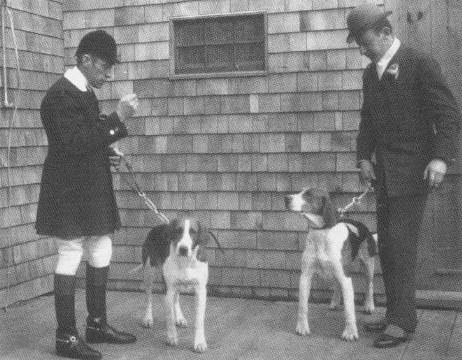 A. Henry Higginson, MFH, Middlesex Hunt, in derby and spats with huntsman Robert Cotesworth and his imported English foxhounds of the period. / Courtesy, National Sporting Library and Museum
A. Henry Higginson, MFH, Middlesex Hunt, in derby and spats with huntsman Robert Cotesworth and his imported English foxhounds of the period. / Courtesy, National Sporting Library and Museum
“They really do work differently,” Allen Potts said to Hal Movius as they watched from a nearby hill top. Hill-topping is one way to get a broader view of the proceedings. Potts was referring not only to the Grafton and Middlesex hounds, but to their Masters as well.
“It’s remarkable,” Movius said. He was from Philadelphia and hunted west of Philly with the Brandywine Hunt. “This is rough country, too. I’ve never seen anything like it.”
From their vantage point, they could see all the way to the Potomac and west to the weather station on the eastern slope of the Blue Ridge Mountains. All around them the landscape dipped and swooped toward hundreds of tiny tributaries then rose again to countless wooded, pastured and orchard-laden hills.
“I’m used to the flat scrubby land around Henrico County,” Potts said. “Considering how hard we’ve been riding, it’s incredible that no one has been more seriously hurt in the past four days. Smith is a maniac.”
“You have to admire both men,” Movius said judiciously.
Just then the hounds gave tongue and flew along the Goose Creek Valley toward Aldie. Allen Potts saw the fox several hundred yards in front of them. “Tally-Ho!” Potts yelled, standing in his stirrups, doffing his cap in his right hand and using it to point toward the fox. It was a beautiful red fox with a great fat white-tipped brush that shook as it bounded between coverts below them.
“He doesn’t seem too worried,” Movius said, and the men galloped after the field.
At the first rail fence a man named Duffy came off his horse when it leaped practically from a standstill into the field beyond. Each rider taking his or her own line to jump and follow the hounds, resulted in the field spreading out at every fence line, road crossing or creek crossing and then coming back together on the other side to continue on the hounds’ line. It was the hounds’ pace that was brutal. As Smith was unable to keep up because of his aching foot, Rozier Dulany attempted to do so, but fell behind when his horse soon became too winded to continue. Other riders tried to do the same. In the end the few who were with hounds after an hour’s run had followed those who knew the country well across dozens of short cuts, listening to the hounds in the distance as they ran. Ham Jackson on Smith’s pony fell, the victim of a hidden ditch on the other side of a seemingly simple fence. The five-foot drop on the far side, which he didn’t notice until mid-air, surprised both he and his pony. They rolled head over heels but came up unscathed.
At the Cross Roads the Grafton hounds lost their scent and checked for about fifteen minutes. Smith had fallen behind. Among the few riders with the hounds was Fred Okie, again acting as Jim Maddux’s replacement judge.
“There he goes!” cried another rider who had chosen to watch from yet another hilltop. The fox could be seen dashing in and out of the underbrush along “the Goose” as the locals called the creek.
“Where’s Smith?” someone asked.
“Not here,” Hal Movius said.
“In that case,” Okie said, “Oui, Sinner, here Sinner,” calling Smith’s lead hound to him.
“Hey! That’s against the rules,” Movius yelled. “You can’t hunt Smith’s pack.”
“To hell with the rules,” Okie said. “That fox is getting away.”
The good hound came running and Okie put him on the track of the viewed fox. Sinner bellowed for his pack mates and off they went again.
Twice the fox swam across Goose Creek; twice the hounds followed. At one crossing Smith and three other riders came off in the mud on the steep slippery creek bank, but they soon remounted and caught up with the pack. When dodging didn’t work, the fox took to a straight line across the valley in an effort to outrun the pack. Only nine riders, including Smith, were with the hounds when they came to an abrupt halt at a decrepit tumble-down house on the Pot House road north of Middleburg.
“Sinner! Spic!” Smith called to his lead hounds, trying to cast them in the woods that surrounded the old house. “On to him. Go on,” he said. But the hounds kept returning to the house.
“He’s got to be under it,” Ham Jackson said to Smith as the hounds circled the old foundation again and again. “He must have a hidey-hole under there.” Marguerite Davis, the only woman at the end of the run, her husband Morley, Rozier Dulany, the judges Dr. McEachran and Hal Movius, Fred Okie and Higginson were there.
“Splendid run,” Higginson said to Smith, thinking the day was probably over. Horses and riders looked thoroughly spent.
“We’re not done yet,” Smith said.
“You’re kidding,” Higginson said.
“Not likely,” Smith said ignoring the look of intense disbelief on the faces of those gathered around the old dwelling. “I said I’d hunt until dusk, and I meant it.”
“Look here, old man,” Dr. McEachran said. “Your hounds have done well.”
“You’re damn right they have,” Smith said.
“Hadn’t you better let well enough alone?”
“Well enough isn’t good enough. I want a kill.”
Rozier Dulany cleared his throat. Smith looked around. He saw in the faces of his friends and rivals a look of elation from the chase mixed with disappointment in his stubborn pride. “Ok. Ok,” he said. “Have it your way.” In a moment Mal Richardson came trotting up to the house, finally catching up to the Master. “About time,” Smith said.
Hal Richardson, Ham Jackson, Rozier Dulany and Claude Hatcher took the hounds back to Oakley. Higginson and his entourage headed south to Middleburg.
“Are you still thinking of buying that horse?” Julian Chamberlain asked Mrs. Pierce. She had seen a horse that she liked very much belonging to Courtland Smith, Harry’s brother, in the Dulany’s field.
“I am thinking of buying him,” Mrs. Pierce said. “I’ll drive over this afternoon for another look. I’ll need to ride him. There must be a reason he’s named Champion.”
In the opposite direction, Smith and the Davises walked their horses home to Oakley.
“By God that was a fine run,” Westmorland Davis said.
“It was,” Marguerite said.
“You’ve stayed up front every day,” Smith said to Marguerite.
“That’s thanks to my good string of hunters,” she said patting her horse.
“And your riding. No reason for modesty,” Smith said.
“Well, someone has to be,” she said.
Posted June 20, 2020
The Great Hound Match is available from online retailers and from the author. Click for more information.
.


